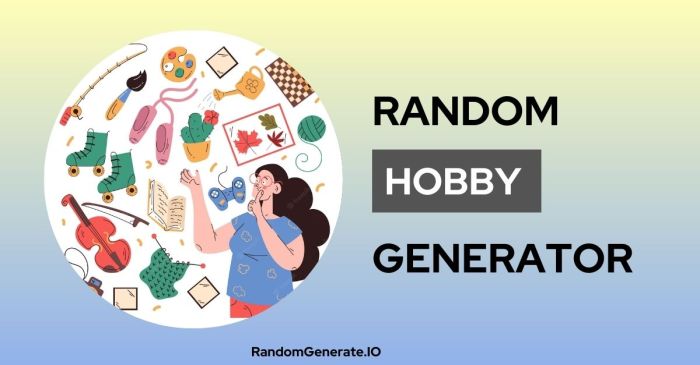Random Hobby Generator: This innovative tool tackles the age-old problem of finding a fulfilling pastime. It leverages algorithms to suggest hobbies based on various parameters, offering a personalized approach to leisure exploration. From creative pursuits like painting to active hobbies such as hiking, the generator caters to diverse interests and skill levels, aiming to unlock hidden talents and foster personal growth.
The potential benefits are numerous, ranging from stress reduction to enhanced creativity and social connections.
Different algorithmic approaches are explored, including weighted random selection and filtering mechanisms to tailor suggestions to user preferences. The design emphasizes user-friendliness, incorporating intuitive navigation and clear visual representations of hobby categories. Data sources are carefully curated to ensure accuracy and diversity, addressing potential biases and promoting inclusivity. The generator’s potential extends beyond individual use, envisioning integration into wellness apps, career guidance platforms, and educational resources.
Understanding the “Random Hobby Generator” Concept

A random hobby generator is a tool designed to suggest new leisure activities to users seeking to expand their horizons or overcome boredom. Its core functionality lies in providing a randomized selection from a predefined database of hobbies, potentially tailored to user-specified preferences. This contrasts with manually searching for hobbies, offering a more spontaneous and potentially insightful approach to discovering new interests.The generation of random hobby suggestions can be approached in several ways.
A simple method involves a purely random selection from a list, offering equal probability to all entries. More sophisticated approaches might incorporate weighted probabilities, favoring certain hobby types based on user demographics, personality traits (if provided), or even current trends. For instance, a generator could assign higher probabilities to outdoor activities during summer months or to creative pursuits based on user-declared artistic inclinations.
Advanced algorithms might even use machine learning to refine suggestions based on user feedback and past selections, creating a personalized hobby recommendation engine.
Approaches to Hobby Suggestion Generation
Different algorithms underpin various random hobby generators. A basic approach employs a simple random number generator to select from a predefined list of hobbies. This approach, while straightforward, lacks personalization. More advanced generators incorporate user input, such as age, interests, or available resources, to filter and weight the selection process. For example, a user specifying a preference for low-cost hobbies would receive suggestions like knitting or photography (using readily available resources), rather than skydiving or competitive sailing.
Another method leverages collaborative filtering, analyzing the hobbies chosen by users with similar profiles to provide tailored recommendations. This approach is particularly effective in large user bases, as it identifies patterns and correlations between user preferences. Finally, some generators might incorporate external data sources, such as trending topics on social media or seasonal events, to further refine the suggestions and reflect current interests.
Benefits and Limitations of Random Hobby Generators
The primary benefit of a random hobby generator is its ability to introduce users to activities they might not have otherwise considered. This serendipitous approach can be particularly valuable for individuals experiencing creative blocks or seeking to diversify their leisure activities. The spontaneity of the suggestions can spark interest and motivation, leading to the exploration of new skills and potential passions.
However, such tools have limitations. The quality of suggestions depends heavily on the comprehensiveness and accuracy of the underlying database. A poorly curated database might lead to irrelevant or unsuitable recommendations. Furthermore, a purely random approach might not always align with a user’s specific needs, preferences, or available resources. The effectiveness of the generator also relies on the user’s willingness to step outside their comfort zone and embrace the unexpected suggestions.
For example, someone predisposed to sedentary activities might find a suggestion for rock climbing unappealing, even if it is randomly generated.
Types of Hobbies Generated

A random hobby generator, designed to broaden horizons and spark new interests, offers a diverse range of activities categorized for ease of exploration. The categorization helps users find hobbies aligned with their preferences, whether they seek creative expression, physical activity, relaxation, or the satisfaction of collecting. The generator’s algorithm ensures a balanced selection across these categories, promoting well-rounded personal development.
Hobby Categories and Characteristics
The following table categorizes hobbies commonly generated, highlighting the unique characteristics of each:
| Creative | Active | Relaxing | Collecting |
|---|---|---|---|
| These hobbies involve artistic expression and imagination. Examples include painting, drawing, sculpting, writing, playing a musical instrument, knitting, crocheting, jewelry making, and digital art. Creative hobbies often foster self-expression and problem-solving skills. | These hobbies focus on physical activity and fitness. Examples include running, swimming, cycling, hiking, yoga, team sports (basketball, soccer, etc.), dancing, martial arts, and rock climbing. Active hobbies improve physical health and can provide a sense of accomplishment. | These hobbies are designed to reduce stress and promote relaxation. Examples include reading, listening to music, meditation, gardening, spending time in nature, watching movies, playing video games (in moderation), and aromatherapy. Relaxing hobbies help manage stress and improve mental well-being. | These hobbies center around acquiring and organizing items of interest. Examples include stamp collecting, coin collecting, comic book collecting, postcard collecting, antique collecting, and collecting figurines. Collecting hobbies often develop organizational skills and historical knowledge. |
Visual Representation of Hobby Diversity
Imagine a vibrant wheel, divided into four quadrants representing the four hobby categories: Creative, Active, Relaxing, and Collecting. Each quadrant is further subdivided into smaller segments, each representing a specific hobby. The Creative quadrant might show a paintbrush splashing vibrant colors, a musical note swirling, and a writer’s pen elegantly scribing on paper. The Active quadrant could depict a runner’s silhouette against a sunrise, a swimmer gracefully gliding through water, and a climber scaling a rock face.
The Relaxing quadrant might showcase a person peacefully meditating, surrounded by lush greenery, and someone engrossed in a captivating novel. Finally, the Collecting quadrant could feature neatly organized rows of stamps, a display of antique coins, and a shelf lined with comic books. The entire wheel, bursting with color and activity, symbolizes the broad spectrum of hobbies available, showcasing the diverse possibilities a random hobby generator offers.
Ultimately, the Random Hobby Generator represents a powerful tool for self-discovery and personal enrichment. By providing a structured and engaging approach to hobby exploration, it empowers individuals to expand their horizons, discover new passions, and enhance their overall well-being. Future development will focus on advanced personalization features, integration with social networks, and the incorporation of user-generated content to build a dynamic and ever-evolving resource for hobby enthusiasts worldwide.
The potential applications are vast, suggesting a significant role for this tool in fostering a more engaged and fulfilling lifestyle.

